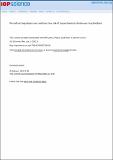| dc.contributor.author | Gao, Xiang | |
| dc.contributor.author | Anthony, Katey Walter | |
| dc.contributor.author | Zhuang, Qianlai | |
| dc.contributor.author | Kicklighter, David | |
| dc.contributor.author | Schlosser, Adam | |
| dc.contributor.author | Sokolov, Andrei P. | |
| dc.date.accessioned | 2013-12-23T13:47:41Z | |
| dc.date.available | 2013-12-23T13:47:41Z | |
| dc.date.issued | 2013-07 | |
| dc.date.submitted | 2013-03 | |
| dc.identifier.issn | 1748-9326 | |
| dc.identifier.uri | http://hdl.handle.net/1721.1/83184 | |
| dc.description.abstract | Climate change and permafrost thaw have been suggested to increase high latitude methane emissions that could potentially represent a strong feedback to the climate system. Using an integrated earth-system model framework, we examine the degradation of near-surface permafrost, temporal dynamics of inundation (lakes and wetlands) induced by hydro-climatic change, subsequent methane emission, and potential climate feedback. We find that increases in atmospheric CH[subscript 4] and its radiative forcing, which result from the thawed, inundated emission sources, are small, particularly when weighed against human emissions. The additional warming, across the range of climate policy and uncertainties in the climate-system response, would be no greater than 0.1 ° C by 2100. Further, for this temperature feedback to be doubled (to approximately 0.2 ° C) by 2100, at least a 25-fold increase in the methane emission that results from the estimated permafrost degradation would be required. Overall, this biogeochemical global climate-warming feedback is relatively small whether or not humans choose to constrain global emissions. | en_US |
| dc.description.sponsorship | United States. Dept. of Energy (Climate Change Prediction Program Grant DE-PS02-08ER08-05) | en_US |
| dc.description.sponsorship | United States. Dept. of Energy. Office of Science (Biological and Environmental Research) | en_US |
| dc.language.iso | en_US | |
| dc.publisher | IOP Publishing | en_US |
| dc.relation.isversionof | http://dx.doi.org/10.1088/1748-9326/8/3/035014 | en_US |
| dc.rights.uri | http://creativecommons.org/licenses/by/3.0/ | en_US |
| dc.source | IOP Publishing | en_US |
| dc.title | Permafrost degradation and methane: low risk of biogeochemical climate-warming feedback | en_US |
| dc.type | Article | en_US |
| dc.identifier.citation | Gao, Xiang, C Adam Schlosser, Andrei Sokolov, Katey Walter Anthony, Qianlai Zhuang, and David Kicklighter. “Permafrost degradation and methane: low risk of biogeochemical climate-warming feedback.” Environmental Research Letters 8, no. 3 (September 1, 2013): 035014. | en_US |
| dc.contributor.department | Massachusetts Institute of Technology. Center for Global Change Science | en_US |
| dc.contributor.department | Massachusetts Institute of Technology. Joint Program on the Science & Policy of Global Change | en_US |
| dc.contributor.mitauthor | Gao, Xiang | en_US |
| dc.contributor.mitauthor | Schlosser, Adam | en_US |
| dc.contributor.mitauthor | Sokolov, Andrei P. | en_US |
| dc.relation.journal | Environmental Research Letters | en_US |
| dc.eprint.version | Final published version | en_US |
| dc.type.uri | http://purl.org/eprint/type/JournalArticle | en_US |
| eprint.status | http://purl.org/eprint/status/PeerReviewed | en_US |
| dspace.orderedauthors | Gao, Xiang; Adam Schlosser, C; Sokolov, Andrei; Anthony, Katey Walter; Zhuang, Qianlai; Kicklighter, David | en_US |
| mit.license | PUBLISHER_CC | en_US |
| mit.metadata.status | Complete | |
